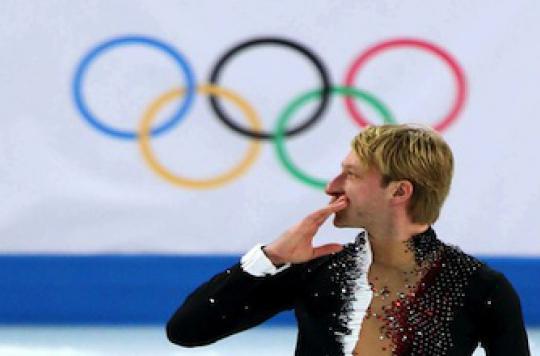According to a British study, athletes have a better chance of winning when they play at home. This is explained by the transcendent effect of the audience, but also by medical and psychological factors.

Will Russian athletes win the majority of medals at the Olympic Winter Games, which take place from 7 to Sochi (Russia)? To this question that everyone is asking, English researchers have provided answers by publishing a study in the American journal ofAssociation for Psychological Science.
For these scientists at the University of Staffordshire, the advantage of competing at home is undeniable. Through a review of the scientific literature, Mark S. Allen and Marc V. Jones identify several arguments in support of this thesis. Among them, the transcendent effect of a crowd that supports you, the high testosterone levels of athletes who play at home, or the fact of not moving which avoids the fatigue of a trip. Thanks to the analysis of sports specialists, why actor dissects these different factors which often facilitate the task of “bookmakers”.
A higher testosterone level in athletes playing at home
Testosterone is a steroid hormone, from the androgen group. In humans, it is secreted mainly by the testes (and in smaller amounts by the adrenal glands and some other tissues). It is the main male sex hormone and the “original” anabolic steroid. It is thus associated with social competition and dominance behaviors. It therefore increases during the anticipation of sports activities and after victory.
In their publication, the English researchers mention a “rise in testosterone levels before home games among footballers.” »Contacted by the editorial staff of why actor, Dr Jean-Christophe Seznec, psychiatrist specializing in sports psychopathology, recounts this discovery.
“In a recent study, researchers found higher testosterone levels in footballers playing at home, compared to those who played away from home. These high rates increase, as we know, the character of dominance. The players are then more aggressive, and more determined on the field. This state of extreme excitement probably explains why when they play at home, athletes win more often. “
And the latter adds that “other studies have also shown that the winners synthesize more testosterone than the losers. Moreover, this observation is the same in individual sports. For example, high levels of testosterone have been found in great chess players. But these studies also had a perverse effect, that of pushing athletes even more towards testosterone doping. This change has been notable in professional cycling. “
As proof of this “dominant” character that testosterone gives, Dr Jean-Christophe Seznec recalls the nickname “the lords” given to themselves by the cyclists of the Festina team during the Tour de France in 1998. That year, the French team led by Richard Virenque was excluded from the tour for doping, in particular with testosterone …
A loyal and passionate audience transcends athletes
In addition, another element is also likely to boost the performance of athletes who run at home. This is the “crowd” factor, as described by sports psychiatrists. In the American magazine, the British doctors explain that playing on his field would have the effect of transcending the players. Example, the rugby union ASM Clermont Auvergne which has been undefeated on its field for years. To be more precise, the Clermont club has not suffered the slightest defeat in its lair, the “Stade Marcel-Michelin “for 4 years.
Thus, on May 4, 2013, by winning a large victory 67-3 against Union Bordeaux Bègles, ASM broke the record for the most uninterrupted victories at home (60). This record is still relevant with an ongoing series which today reaches 71 games without defeat at home.
At the same time, the public in Clermont often wins the prize at the annual “La Nuit du Rugby” ceremony with the title of best audience in the top 14 (2007, 2008, 2009). Should we see a sign?
Another example is that of the football world cups in which the great nations of this sport, when they organize the competition, very often seize the Jules Rimet trophy from FIFA (1). The most famous example, still in the memory of many French people, is certainly that of the 1998 Football World Cup. France, which organized the event, was the winner that year, with a final won 3 in 0 against Brazil, in a Stade de France in total turmoil.
Counter-examples exist, however, with the defeats of Italy in 1990, and Germany in 2006, which did not even reach the final in those years, even though the two countries were organizing the competition.
Listen to Dr Jean-Christophe Seznec, psychiatrist and sports doctor: ” The public provokes a phenomenon of reassurance among athletes. Having passionate supporters is beneficial for athletes…“
The stress hormone may also inhibit some home athletes
And to explain these surprising defeats, we should perhaps look on the side of cortisol, a steroid hormone that is released in the body in response to physical or psychological stress. This hormone, still according to our British researchers, would be released in greater quantities during home matches in certain athletes.
This could then explain why famous athletes always miss their competition every time the event takes place in their country. Here, we can unfortunately cite the case of French tennis players who perform very well in minor ATP tournaments, but who are unable to win the Parisian Grand Slam at Roland Garros except Yannick Noah.
As such, the former world number 1 Amélie Mauresmo has always raised many questions from the French public. Despite her victories at the Australian Open (Melbourne) and Wimbledon (London), the Frenchwoman has always been unable to pass the quarter-finals stage at the French Open despite her 15 participations!
Listen to Dr Jean-Christophe Seznec : ” For some athletes, the family or the public is inhibiting. They have in their presence the impression of being constantly judged and cannot free themselves …“
Finally, Dr Bruno Sesboué, sports doctor at the Caen University Hospital, cites other factors that are harmful to athletes who compete outside. Among them, the change of food, for example on a distant continent, which can affect the energy intake to which any athletic body is accustomed.
But this doctor also recalls that this collateral damage avoided by athletes who play at home is diminishing. In particular because today, the staffs of the teams are more and more professional. “The latter are now developing routes calculated to be as short as possible, and include cooks in the sports delegation so as not to upset the eating habits of athletes,” he explains.
Hopefully the French team traveling to Sochi has planned everything! Score to beat, a small 8th place in the ranking of the most medal-winning nations (in total) at the last Olympic Winter Games in Vancouver in 2010.
Listen to Dr Bruno Sesboué, sports doctor at Caen University Hospital: “ If an athlete changes his diet completely when he arrives at a competition abroad, it will disrupt him. In particular his organization which …“
(1) International Federation of Association Football
.















